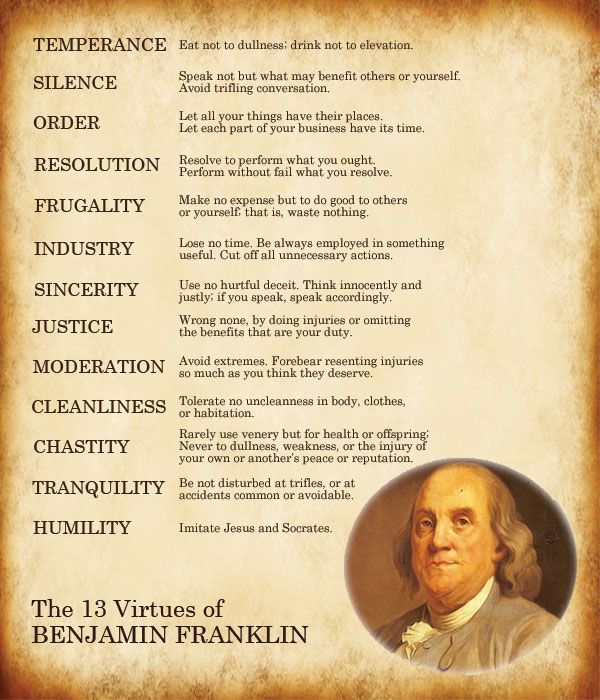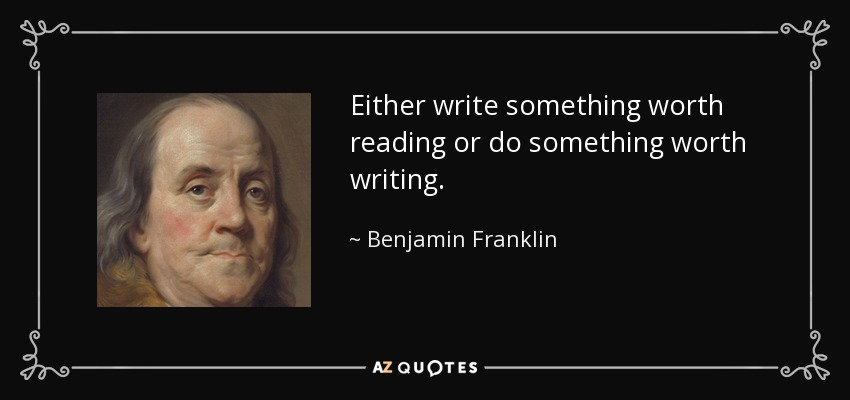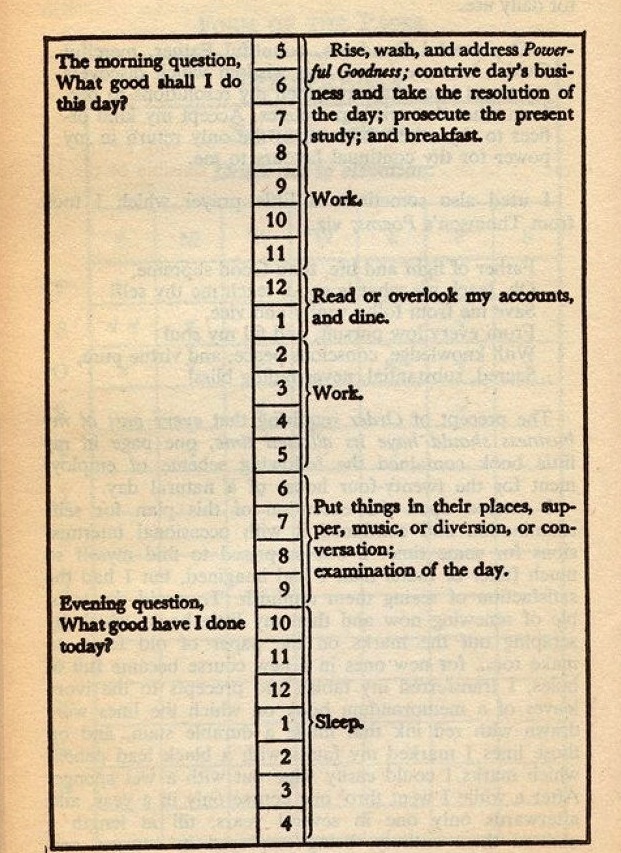Change Your Paradigm, Change Your Life: Proctor, Bob: 9781722505233: Amazon.com: Books
To change your life—you MUST change your paradigm. The change is not easy, but it's worth it, and the results are lasting. Bob Proctor will show you his proven methods for doing so. This book will synthesize his decades of study, application, and teaching ...Saturday, July 27, 2024
Saturday, July 20, 2024
Virtues mastering by Benjamin Franklin
Benjamin Franklin has created his success from almost nothing
by self-improvement and diligence, focusing on key virtues
Method: practice one virtue per week,
4 times a year (13*4=52 weeks/year),
Effectively master all virtues each season, again.
Smart!
Amazon.com: Benjamin Franklin's Book of Virtues (Books of American Wisdom): 9781429093552: Franklin, Benjamin: Books
Ben Franklin: The Thirteen Necessary Virtues @ fs
In book The Autobiography of Benjamin Franklin,
we find a list of thirteen virtues that Franklin
thought were necessary or desirable.
and valued for their ability to promote
individual and societal well-being.
- Temperance: Don’t overeat or overdrink. Maintain balance.
- Silence: Speak only when it benefits others or yourself; avoid trivial conversations.
- Order: Organize your belongings and allocate time for each task.
- Resolution: Commit to doing what you should and follow through.
- Frugality: Spend money wisely, avoiding waste.
- Industry: Stay productive; eliminate unnecessary actions.
- Sincerity: Be honest and just in your thoughts and speech.
- Justice: Avoid harming others and fulfill your duties.
- Moderation: Avoid extremes and don’t overreact to injuries.
- Cleanliness: Keep yourself and your surroundings clean.
- Tranquility: Don’t be upset by minor issues or unavoidable accidents.
- Chastity: Use sexual activity responsibly for health or procreation, not excessively.
- Humility: Learn from the examples of Jesus and Socrates.
I started with Temperance because it helps maintain a clear mind—a crucial quality when dealing with old habits and constant temptations. Once I established temperance, practicing Silence became easier. I aimed to gain knowledge while improving my character. Since listening contributes more to learning in conversations than speaking, I consciously avoided excessive chatter, puns, and jokes. Silence took second place."
Franklin's Method for Self-Improvement
- Daily Reflection:
At the end of each day, Franklin would reflect on his behavior,
noting any lapses in adhering to his virtues. - Focused Improvement:
He would not attempt to perfect all virtues at once.
Instead, he would focus on one virtue per week,
giving it extra attention. - Progress Tracking:
Over time, the goal was to see fewer marks on the chart,
indicating improvement in practicing each virtue.
Updated Summary (by AI)
Temperance: In our fast-paced world, it’s essential to maintain balance. Eat mindfully, neither to excess nor to the point of dullness. Similarly, be mindful of your drinking habits—don’t let it elevate you to a point where it impairs your judgment or well-being.
Silence: Words have power. Speak only when your words can benefit others or yourself. Avoid idle chatter and focus on meaningful conversations that contribute positively to your life and those around you.
Order: Organize your life. Give everything its place—whether physical objects or tasks. Allocate time for each aspect of your business, ensuring efficiency and preventing chaos.
Resolution: Set clear goals and stick to them. Resolve to do what you ought to do, and follow through without fail. Whether it’s personal growth, work, or relationships, commitment matters.
Frugality: Be mindful of your expenses. Spend only when it serves a purpose—to benefit yourself or others. Avoid wastefulness and invest wisely in things that matter.
Industry: Time is precious. Always engage in something useful. Cut out unnecessary distractions and focus on tasks that contribute to your growth, productivity, and well-being.
Sincerity: Honesty matters. Avoid deceitful behavior. Think innocently and justly, and let your words align with your thoughts. Authenticity fosters trust and meaningful connections.
Justice: Treat others fairly. Avoid causing harm through actions or omissions. Fulfill your duties and uphold the rights of others. Justice is the cornerstone of a harmonious society.
Moderation: Extremes rarely lead to good outcomes. Avoid overreacting to injuries or perceived slights. Maintain a balanced perspective, even when faced with adversity.
Cleanliness: Take care of your physical environment. Keep your body, clothes, and living spaces clean. A clutter-free environment promotes clarity of mind.
Tranquility: Life is full of minor disturbances. Don’t let trifles unsettle you. Accept unavoidable accidents gracefully, maintaining inner peace.
Chastity: In the context of modern relationships, prioritize emotional and physical health. Intimacy should be purposeful—for health or family planning—rather than driven by excess or societal pressure.
Humility: Learn from great examples. Imitate the wisdom of Jesus and the philosophical insights of Socrates. Humility allows growth and openness to new perspectives.
Saturday, July 13, 2024
Ralph Waldo Emerson, essays & books
Ralph Waldo Emerson - Wikipedia
Ralph Waldo Emerson (May 25, 1803 – April 27, 1882),[2] who went by his middle name Waldo,[3] was an American essayist, lecturer, philosopher, abolitionist, and poet who led the Transcendentalist movement of the mid-19th century. He was seen as a champion of individualism and critical thinking, as well as a prescient critic of the countervailing pressures of society and conformity.
PNTV: The Selected Writings of Ralph Waldo Emerson by Ralph Waldo Emerson (#61) - YouTube
PNTV: Self-Reliance by Ralph Waldo Emerson (#378) - YouTube
Amazon.com: Ralph Waldo Emerson: books, biography, latest update
Self-Reliance - Ralph Waldo Emerson - Summary & Full Essay
Key Points:
- Urges his readers to follow their individual will instead of conforming to social expectations.
- Emphasizes following one’s own voice rather than an intermediary's, such as the church.
- He encourages his readers to be honest in their relationships with others.
- Posts the effects of self-reliance: altering religious practices, encouraging Americans to stay home and develop their own culture, and focusing on individual rather than societal progress.
- Merriam-Webster defines self-reliance as "reliance on one's own efforts and abilities."
In broader contexts, self-reliance can be viewed as an individual's confidence in their capacity to manage their own life, make their own decisions, and provide for themselves without excessively depending on others. This concept is often celebrated in various cultures and philosophies for fostering independence, resilience, and personal growth.
Ralph Waldo Emerson Quotes - BrainyQuote
Ralph Waldo Emerson - Nothing great was ever achieved without enthusiasm.
here are original texts:
Books by Emerson, Ralph Waldo (sorted by popularity) - Project Gutenberg
Essays by Ralph Waldo Emerson by Ralph Waldo Emerson | Project Gutenberg
Nature by Ralph Waldo Emerson | Project Gutenberg
The Project Gutenberg eBook of Essays, by Ralph Waldo Emerson
SELF-RELIANCE
original start poem:
"Ne te quæsiveris extra.""Man is his own star; and the soul that canRender an honest and a perfect man,Commands all light, all influence, all fate;Nothing to him falls early or too late.Our acts our angels are, or good or ill,Our fatal shadows that walk by us still."
translated to modern English by Copilot AI
“Do not seek outside yourself."
(from Latin; in other words, it encourages introspection and looking within for answers)
"Man is his own star; within his soul,
He shapes an honest, perfect self, a whole.
Commands he light, fate's intricate design,
No timing early or too late aligns.
Our deeds, like angels, guide us on our way,
Or shadows dark that linger night and day.
Self-Reliance by Ralph Waldo Emerson [Audiobook] #individualism #freedom #classicliterature - YouTube
Self-Reliance, by Ralph Waldo Emerson (audiobook) - YouTube
first paragraph
I read the other day some verses written by an eminent painter which were original and not conventional. The soul always hears an admonition in such lines, let the subject be what it may. The sentiment they instill is of more value than any thought they may contain. To believe your own thought, to believe that what is true for you in your private heart is true for all men,—that is genius
a modern English translation:
Saturday, July 6, 2024
book: Direct Line by by Earl Nightingale
Known as the “Dean of Personal Development,” Earl Nightingale broadcast his radio programs for more than three decades on over 1,000 radio stations in twelve countries around the world, making him one of the most listened-to broadcasters in history. ...
Nightingale’s audio program The Direct Line is being offered in a beautifully packaged print edition. This book offers a practical guide designed to help you find real and lasting success in your career, relationships, and finances. The messages shared in it will help you begin the most exciting and rewarding journey on earth—your journey of self-discovery and personal fulfillment.
Earl Nightingale - Wikipedia
The Direct Line by Earl Nightingale - YouTube (1)
by Nightingale Conant - YouTube
Direct Line 24 Earl Nightingale - YouTube
"Here are Kenneth Good’s seven steps to winning:
- Focus on the goal:
Bullseye all immediate objectives
into a single goal. - Project the direct line:
Survey the straightest,
simplest way for you to reach that single goal. - Fix a definite date for arrival:
Set a deadline. - Schedule a program for daily delivery of achievement:
Keep working consistently
to bring you closer to your goal by the fixed date. - Control your rate of progress:
Regularly compare your progress with the pre-arranged schedule,
similar to a railroad conductor checking if you’re on time. - Deliver from within:
Use both physical and emotional self-operation
—the greatest power you’re capable of producing. - Reduce resistance from without:
Present your project advantageously
to overcome external obstacles.
Anyone willing to effectively follow these seven steps
is virtually guaranteed to succeed in any undertaking."
Internet Archive: Digital Library of Free & Borrowable Books, Movies, Music & Wayback Machine










